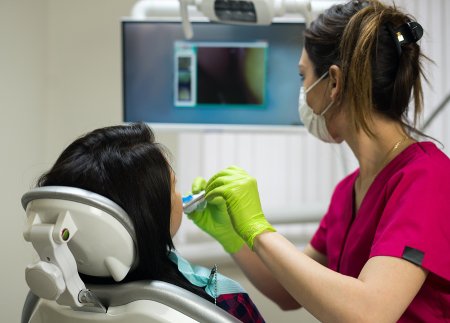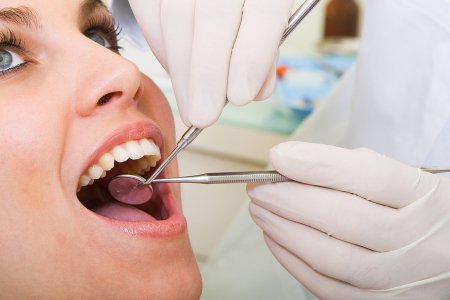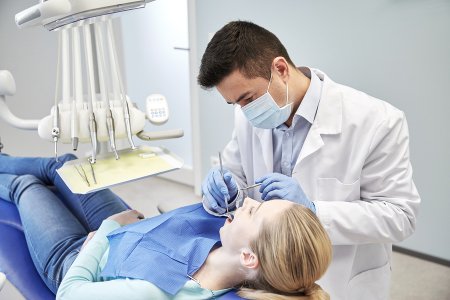-
What Is Denture Relining?
Dentures are a great way to restore the look and function of missing teeth. Over time, however, patients’ jaw and gum shapes can change and cause dentures to feel loose and uncomfortable. Dentists will often recommend a denture reline when patients complain of ill-fitting dentures. This is a safe and effective way to change the shape of the denture where it connects to the gums. Here is a better look at denture relining:

There are two types of denture relining: Hard and soft. A soft reline is the most common, because it is often the most comfortable and can be done in the dentist’s office. The dentist or a trained assistant will line the denture with a liquid polymer that will harden into a soft layer of added comfort. A hard reline is done with a different, harder solution that is similar to the denture. Hard relines tend to last longer than soft relines.
Choose Glenwood Premier Dental for your restorative care with our dentists serving Hazlet. We can address your denture issues to provide you with a comfortable and functional fit. Please call us at (732) 264-4477 to set up an appointment.
-
The Benefits of Dental Sealants
Dentists often recommend dental sealants for young children and patients prone to excessive tooth decay. Covering the molars in sealants can help reduce or prevent the development of cavities that could lead to root canal infections. Read on for a better look at the benefits that come with dental sealants.
As seen in the video, there are tiny pits and fissures on teeth that cannot be reached by a traditional toothbrush. Dentists place dental sealants over these areas to block bacteria from growing and causing infections and decay. Sealants can last for several years, but a dentist should always inspect the sealants for defects and bacteria growth. Daily oral hygiene and nutrition should also be followed to prevent tooth decay.
Call Glenwood Premier Dental for a checkup on tooth decay, gum disease, and teeth cleaning in Hazlet . We are available at (732) 264-4477 to answer questions and schedule appointments.
-
A Patient’s Guide to Tongue-Tie Surgery
The condition known as tongue-tie, or ankyloglossia, is very common, and it is a condition that’s present at birth. There are different tongue-tie surgery options to break the band of tissue that tethers the tongue to the floor of the mouth, such as a laser or electrocautery procedure. Laser procedures for tongue-tied patients may be found in a dentist’s office alongside their laser dentistry procedures. Let’s take a closer look at tongue-tie surgery.

The Options
There are four surgical options commonly used for patients who are tongue-tied . The most common options for infants involves snipping the frenulum or surgically revising it under general anesthetic. Other options include electrocautery with the use of a local anesthetic or a laser procedure with a gel analgesic. These options are often performed under an outpatient status in a dentist’s or doctor’s office.
The Advantages
The advantages of tongue-tie surgeries can change patients’ lives. Many tongue-tied people experience difficulty speaking and must undergo several hours of speech therapy. Tongue-tied babies also have difficulty breastfeeding and receiving proper nutrition. Tongue-tie surgeries can relieve these issues so children grow up without speech issues or need only receive minimal speech therapy. Surgeries performed on newborns can also significantly improve breastfeeding results for mothers and babies.
The Risks
The risks for any tongue-tie surgery are minimal. The snipping surgery carries a slight risk of infection, because there is an open wound in the mouth. However, this tiny cut often heals quickly and without issue. Surgery under general anesthetic may carry risks associated with infection and anesthesia. There is also a possibility that a second procedure—with laser, surgery, or electrocautery—may be required to fully repair the issue. Additional speech therapy may be required as well.
The dentists and dental staff of Glenwood Premier Dental are dedicated to providing comprehensive care for our patients, and that is why we offer laser dentistry near Hazlet. With laser dentistry , we can correct tongue-ties and offer restorative care for teeth with extensive tooth decay. Learn more by calling our office at (732) 264-4477.
-
A Closer Look at Implant-Supported Bridges
Implant dentistry offers patients with one or more missing teeth the opportunity to restore their smiles and improve their health. Patients may qualify for implant-supported bridges, crowns, or dentures. A dentist will determine patients’ candidacies depending on the amount of tooth and bone loss. Read on for a better look at implant-supported bridges and how they can benefit patients.

They can reduce bone loss.
Dentists often recommend implant-supported bridges and dentures to replace missing teeth, because implants can reduce the amount of bone loss in the jawbone. If there is significant bone loss, then patients may experience a misshapen jawline and chin structure. However, implants placed directly into the jawbone bond with the bone and help strengthen it against future bone loss. This is vital to patients missing one or more teeth, so their smile and facial structure are not altered.
They can improve nutrition.
Patients with missing teeth often refrain from eating the healthy meats and vegetables that doctors recommend. Patients may find it difficult to chew on these foods, so they choose soft and over-processed foods. These foods often contain heavy amounts of sugar and carbohydrates that can contribute to increased tooth decay, gum disease, and weight gain. Patients can improve their nutrition and dental health by choosing implant-supported bridges. These restorations will remain steady and strong under the chewing forces needed to consume healthy meats and vegetables.
They can restore a smile.
When patients have missing teeth, they may feel self-conscious about their smile and speech. Implant-supported bridges offer patients a natural-looking way to restore their smile. The bridge is formed after multiple x-rays, scans, and molds have been taken of the patient’s mouth, so the bridge will look like the patient’s natural teeth. Patients can smile and speak without any embarrassment or worry once they receive their implant-supported bridges.
Receive exemplary restorative care with the dentists of Glenwood Premier Dental. We will provide a full dental exam to address missing teeth and candidacy for implant dentistry near Hazlet . Please call us at (732) 264-4477 to set up a consultation.
